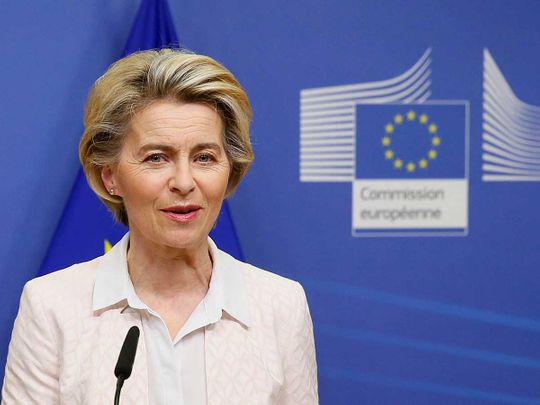
London: British Prime Minister Boris Johnson and EU chief Ursula von der Leyen held emergency talks Saturday to try to break the deadlock in post-Brexit trade deal negotiations as time runs short for an agreement.
Details about the outcome of the crunch phone call - which began at 1630 GMT - were yet to emerge, with pressure intensifying to strike a deal with just weeks left until the Brexit transition period ends on December 31.
The political intervention follows UK and European Union envoys pausing last-ditch talks late Friday and acknowledging that the conditions for an agreement had not been met.
In a joint statement, top British negotiator David Frost and his European counterpart Michel Barnier said "significant divergences" remained over several key issues that have stalled talks since the summer.
A deal is seen as essential to avoid deep disruption on both sides - but especially in Britain - to economies already damaged by the coronavirus pandemic.
EU Commission President von der Leyen was said to be in "constant contact" with member state leaders, and was briefed by Barnier before the conversation with Johnson.
The EU's chief negotiator told reporters in London ahead of his return to Brussels that his team would "keep calm, as always".
"If there is still a way, we will see," he added.
Johnson and von der Leyen last spoke on November 7, but a month later Britain and the bloc remain divided over so-called level playing field provisions, governance and fisheries.
A European source told AFP on Friday of "serious difficulties" at this crucial late stage in the process, while UK government sources told British media outlets the EU side was making "completely unrealistic" demands.
Johnson may also try to speak with other European leaders over the weekend, including French President Emmanuel Macron, according to the Financial Times.
Bloc leaders will hold a summit on Thursday, by which time many expect to know whether reaching a Brexit deal is feasible.
"I would expect instructions for the negotiators to finish the talks in a couple of days. But a breakdown also has a considerable chance," another European source said.
'Failure of statecraft'
Britain formally left the EU in January, nearly four years after a referendum on membership that divided the nation.
But it has remained bound by most of its rules until the end of the year, as the two sides try to agree the exact nature of their future relationship.
Without a deal, the bulk of cross-Channel trade will revert to World Trade Organization terms, an unwanted return to tariffs and quotas after almost five decades of deepening economic and political integration.
Talks through this year have finalised most aspects of an agreement, with Britain set to leave the EU single market and customs union, but the most thorny issues have remain unresolved.
European capitals have remained remarkably united behind Barnier through the fraught Brexit process, but some internal fractures have now begun to surface.
France on Friday threatened to veto any deal that fails short of their demands on ensuring fair trade and access to UK fishing waters.
Meanwhile, a European diplomat told AFP that Belgium, the Netherlands, Spain and Denmark share Paris's concerns that the EU side could give too much ground on rules to maintain competition.
In Britain, Johnson has insisted Britain will "prosper mightily" whatever the outcome of the talks, but he will face severe political and economic fallout if he cannot seal a deal.
"If we fail to get an agreement with the European Union, this will be a serious failure of statecraft," Conservative lawmaker Tom Tugendhat, Chair of parliament's foreign affairs committee, told the Lowy Institute in an interview published Saturday.
German MEP Manfred Weber, the head of the European Parliament's conservative EPP grouping, saying it was "now or never" for a deal.
"@BorisJohnson needs to make a choice between the ideology of #Brexit and the realism of people's daily lives," he said on Twitter.
"In the middle of the Covid crisis we owe it to our citizens and businesses to find an agreement."








